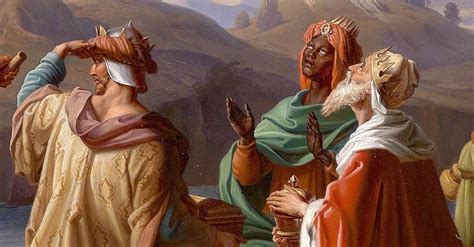Wise men have always looked at the heavens with wonder. For them, the night sky filled with stars represents the luminous, the utterly ineffable, the holy. With this sense of overwhelming awe, comes a question: “What lies behind it all?”
Wise men don’t ignore this question by burying themselves in practical matters, to ignore their own inner prompting – they search. With the first step another question is evoked; it comes as an unexpected whisper — “Why is there something rather than nothing?”
Wise men are thus called because they seek what the ancients called knowledge of “first things,” the foundation of all knowledge, and the source of all. When the Three Wise Men were amazed by the one star outshining all the others in the Eastern sky they saw it as their destination, the goal of their search, a place where all they sought would be revealed.
Thus, from the East, the Wise Men came, from the crucible of civilization, the most ancient of learned cultures, to the court of Herod in Jerusalem. Whether they were deceived by Herod’s flattery we do not know, nor do we know if they sensed his murderous intent in asking them to return and report on the child’s whereabouts. Though wise men, we do not know if these kings were worldly-wise. We do know, however, they believed in the message of their dreams.
They found who they were looking for, the babe with the title “The King of the Jews,” but would come to realize they had found much more, perhaps something else altogether. After all, they must have thought, “Would a king be born like this and to a peasant family?” But this was the place where the star’s light had led them. The Three Kings did not turn back; they knelt in the stable, worshipped the babe, and offered him their royal gifts.
The Wise Men slept deeply that night because they had journeyed far. During their sleep, a dream arose containing a warning not to return to Herod, as they had promised they would. They did not know why — they did not know then that the birth of this child born to peasants had provoked a Roman king to a murderous rage, born of fear and jealousy.
As they rode away, without returning to Jerusalem, the Three Wise Men must have asked each other why a child born in a manger to a carpenter and his young wife would pose any threat to Herod, or the Empire itself. But then, the night had been extraordinary in other ways. They had not been the only ones to pay tribute – they had knelt as kings next to shepherds who reported being summoned by angels.
What they had experienced at the end of their journey was not expected. A poor child in a stable, with some sort of divine protection, was something they had never even imagined. Did this newborn child explain their wonder at the existence of things? Not at all.
But they didn’t accuse the star of leading them to the wrong place or consider their long journey a mistake. For they had received a glimmer of something to come: Their experience with the babe in a manger seemed to announce the beginning of a life that would overturn the order of things and challenge the supremacy of all earthly powers.
“But for what purpose came this child?” they might have asked themselves. Whatever it was, they may have reasoned, it must be universal, a mission to all men. What else could bring kings and shepherds to kneel together, cause the most powerful man in the land to rage, for some divinity to send a dream of warning, and set the night sky itself aglow with the brightest star the world had ever seen.
